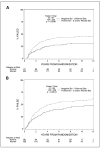Bcl-2 and Bax expression predict prostate cancer outcome in men treated with androgen deprivation and radiotherapy on radiation therapy oncology group protocol 92-02
- PMID: 17575222
- PMCID: PMC2763095
- DOI: 10.1158/1078-0432.CCR-06-2972
Bcl-2 and Bax expression predict prostate cancer outcome in men treated with androgen deprivation and radiotherapy on radiation therapy oncology group protocol 92-02
Abstract
Purpose: Bcl-2 is antiapoptotic, and its overexpression has been associated with resistance to androgen deprivation and poor outcome in some patients treated with radiotherapy. Bax is proapoptotic, regulating Bcl-2 through heterodimer formation. In a prior study, Bcl-2 and Bax were not related to outcome in locally advanced patients treated with radiotherapy or short-term androgen deprivation + radiotherapy (STAD+RT) on another Radiation Therapy Oncology Group trial (86-10). A follow-up investigation was carried out here in more contemporary high-risk men treated on Radiation Therapy Oncology Group 92-02 with STAD+RT or long-term AD+RT (LTAD+RT).
Experimental design: Adequate tissue was available to be analyzed immunohistochemically in 502 patients for Bcl-2 and 343 patients for Bax. Univariate and multivariate analyses by Cox proportional hazards models were applied to end points of failure.
Results: Bcl-2 was positive in 45.6% cases, and Bax expression altered in 53.9% cases. Abnormal Bcl-2 was not related to any of the failure end points tested. Altered Bax expression was significantly associated with any failure (P = 0.023) and marginally with biochemical failure (P = 0.085). The combination of negative Bcl-2/normal Bax expression seemed more robust, being significantly related to reduced biochemical failure (P = 0.036) and any failure (P = 0.046). The predictive value of negative Bcl-2/normal Bax was most pronounced in those who received STAD+RT, as opposed to LTAD+RT.
Conclusions: Normal Bax expression was associated with significantly more favorable outcome. The combination of negative Bcl-2 and normal Bax was more consistently significant, particularly when STAD+RT was the treatment administered. These data suggest that LTAD+RT should be used when either Bcl-2 or Bax is abnormally expressed.
Figures
Comment in
-
"No Turning Bax" in the combined battle against prostate cancer:Clin Cancer Res. 2007 Jun 15;13(12):3435-8. doi: 10.1158/1078-0432.CCR-07-0810. Clin Cancer Res. 2007. PMID: 17575204 Free PMC article. Review. No abstract available.
References
-
- McDonnell TJ, Troncoso P, Brisbay SM, et al. Expression of the protooncogene bcl-2 in the prostate and its association with emergence of androgen-independent prostate cancer. Cancer Res. 1992;52:6940–4. - PubMed
-
- Tsuji M, Murakami Y, Kanayama H, Sano T, Kagawa S. Immunohistochemical analysis of Ki-67 antigen and Bcl-2 protein expression in prostate cancer: effect of neoadjuvant hormonal therapy. Br J Urol. 1998;81:116–21. - PubMed
-
- Paterson RF, Gleave ME, Jones EC, Zubovits JT, Goldenberg SL, Sullivan LD. Immunohistochemical analysis of radical prostatectomy specimens after 8 months of neoadjuvant hormonal therapy. Mol Urol. 1999;3:277–86. - PubMed
-
- Zellweger T, Ninck C, Mirlacher M, et al. Tissue microarray analysis reveals prognostic significance of syndecan-1 expression in prostate cancer. Prostate. 2003;55:20 –9. - PubMed
Publication types
MeSH terms
Substances
Grants and funding
LinkOut - more resources
Full Text Sources
Other Literature Sources
Medical
Research Materials


